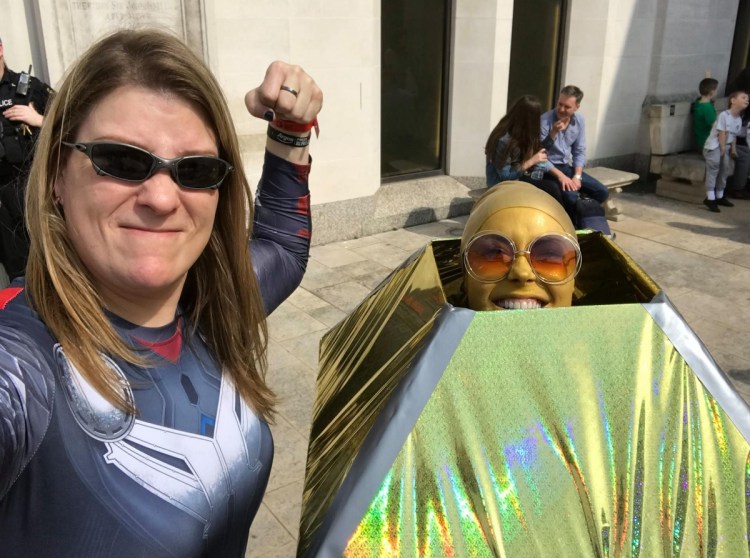Kate Edwards was very outspoken as the executive director of the International Game Developers Association. After five years in that job, she left in June 2017. And she’s still outspoken.
In fact, Edwards can talk about more issues now than she could while she worked for the IGDA, which represents the interests of game developers and now counts Jen MacLean as its leader. While at the IGDA, Edwards spoke out against Gamergate, the angry gamer movement, at great personal risk, and she documented crunch time, or forcing developers to work unpaid overtime, in the game industry.
She is CEO at Geogrify, providing geocultural and geopolitical content advice to game companies. And she is a board member at Take This, which helps game developers deal with mental health issues.
Edwards has traveled the world, giving speeches in places like Tehran, Iran, and Stockholm, Sweden. She’s also one of the most dedicated cosplayers in the gaming world, as you can see from the pictures. She has rare insights into game development around the world.
She’s at San Diego Comic-Con International now, but I talked to her during a recent visit to Hollywood at Universal Studios. We talked about her life post-IGDA, ageism in game development, the ArenaNet controversy where two writers were fired for arguing with fans, WHO’s declaration of gaming as a possible addiction, her belief that a union or legal defense fund should be created for developers, crunch time, and variety of other game developer topics.
Here’s an edited transcript of our interview.
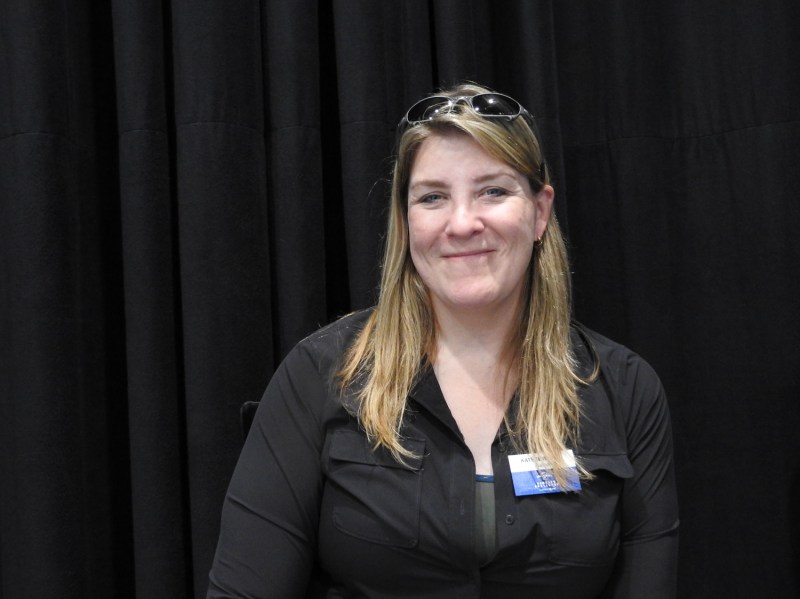
Above: Kate Edwards is CEO of Geogrify and a board member at Take This.
GamesBeat: I still detect, from your social media, that you’re saying a lot of the same things you said while you were executive director at IGDA. It seems like it’s ingrained.
Kate Edwards: I think it is. A lot of people may have misunderstood why I took the IGDA role in the first place. It’s not that the role came along and then I became an advocate. I had already grown this desire to make this a better place as an industry. Because I’d already been involved in the IGDA for many years before I took the executive director role, I thought, “Okay, maybe this will be the tool I can use to make change happen.” That’s why, when they asked me to interview for the role, I gladly said yes, and when they offered it, I said yes again. I was really in that mindset.
I still do my culturalization work on the side because it’s my passion. It’s what I love to do. But advocacy has become a stronger passion. I had it before I took the IGDA role. The IGDA role amplified it to a great degree. And now, having left, I saw doing that work for five years as a means to an end. I could test the waters of advocacy, see if we could make things happen, and understand how we can and cannot make change happen. I walked away from that experience with wisdom about what we can do next.
GamesBeat: Do you feel more free now to talk about things that you’re passionate about? More than you were able to at the IGDA?
Edwards: Yes. I can now say and do anything I want. [Laughs] That’s why my gameadvocacy.org site — it’s my style of advocacy, which others have described as aggressive and blunt. In my observation, being in the industry so long, especially when I was running the IGDA, that’s what this industry needs right now. Change is not happening fast enough.
GamesBeat: Part of that was the ageism issue. You came up with a list that looked like it represented a lot of work.
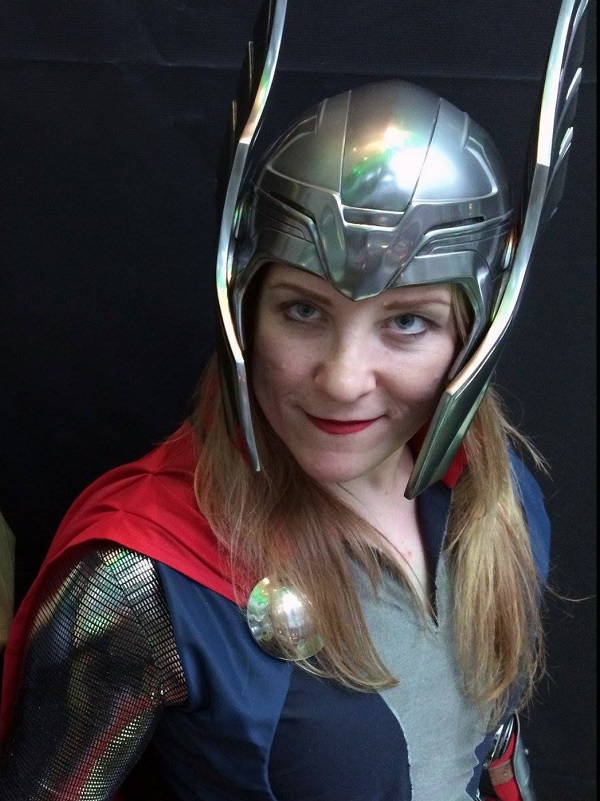
Above: Watch out for Kate Edwards’ hammer.
Edwards: Yes. It’s funny, because that was done very much on a whim. I’d been mulling it over for a while. Why don’t we have a list like this? The 50-over-50 list. I’d been thinking about it for a while, but then it was just earlier this year, on a whim — I guess maybe it was the fact that I was then living in the Netherlands. I had a chance to refocus some of my work priorities. That happens when you change location. I decided to go ahead and do it. I wrote up the Google form to ask for nominations, and on Monday I dropped it out into the community as far and wide as I could.
Immediately the response was overwhelming. “This is awesome, this is great, this is so cool.” I left it open for about five weeks, if I’m not mistaken. I got more than 200 nominations before I closed it off. Originally my plan was to present it at GDC, but I was so busy at GDC with various obligations, still being on the committee for the advocacy track and all that — I collected the information, and then I got super busy in my travels and working in the Netherlands.
I sat on it for a while until I got to a point where people said, “Hey, whatever happened to that list?” Then E3 was coming up, and that was a perfect opportunity, another nice punctuated media wave to catch. That’s when I decided to release it. I went through the process of taking all the names suggested, ranking them by the number of nominations they received, and doing a simple cutoff at 50 people.
GamesBeat: Some people wanted to be on the list and weren’t on it.
Edwards: [Laughs] Of course a lot of the feedback I got was, “Hey, where’s the 40-over 40? Where’s the 60 over 60?” All these others. Many were joking. Some were not so joking. I also did get several contacts in private saying, “Why am I not on this list? I’m famous.”
GamesBeat: Did you get any people who said they didn’t want to be on the list?
Edwards: That’s actually a great point. When I had discussions with some people about this list, after I’d collected the names — somebody suggested, “Why don’t you ask them first?” I was on the fence. Some people said, “Just release it. Nobody asks the 30 under 30.” But it’s different. It is a different issue for people who are older in the industry, to be outed, so to speak, as being “old.” I thought it was a fair thing. I felt I’d rather be safe than sorry, so I contacted everyone on the list to see if they were okay with this. Overwhelmingly, everyone — not a single person said no. They all said, “I’m so honored, yes, please include me.”
GamesBeat: It felt like an issue that hadn’t been tackled so much. People haven’t necessarily put this at the forefront of things they’re concerned about.
Edwards: No, I don’t think so. It’s one of many issues that have been discussed in the industry for many years, but it is becoming more prevalent, at least in my experience in the last decade or so, because the work population is aging. Our industry hasn’t been around that long, but it’s been around long enough to where we do have a lot of people in their 50s and 60s who are still working, or trying to work, in the industry.
I’ve heard countless anecdotal stories of people, even in their late 30s, who have a very difficult time finding work. After a while they wonder if it’s their age. They have amazing credentials, a lot of experience on multiple franchise, but for some reason they can’t land a job. Even when I was running the IGDA, when I gave advocacy-focused lectures, I would tell people — we’re so focused on sexism, and for good reason, because of Gamergate and everything else that happened, and now the #MeToo movement, but ageism is really close behind that.
It’s the one that tends to be a bit more silent. That’s why when — 2015 is when I turned 50. At the IGDA party we did, that was exactly a week after my birthday. I decided to defer my birthday and hold that party at the IGDA party during GDC. I made a point of telling people, “I’m celebrating that I’m 50 and I’m not ashamed to say it.” But then of course I would joke with people that I’m doubly screwed in the industry now, because I’m both a woman and over 50. As a joke, obviously. It’s not a universal reality, but it’s a reality for some people.
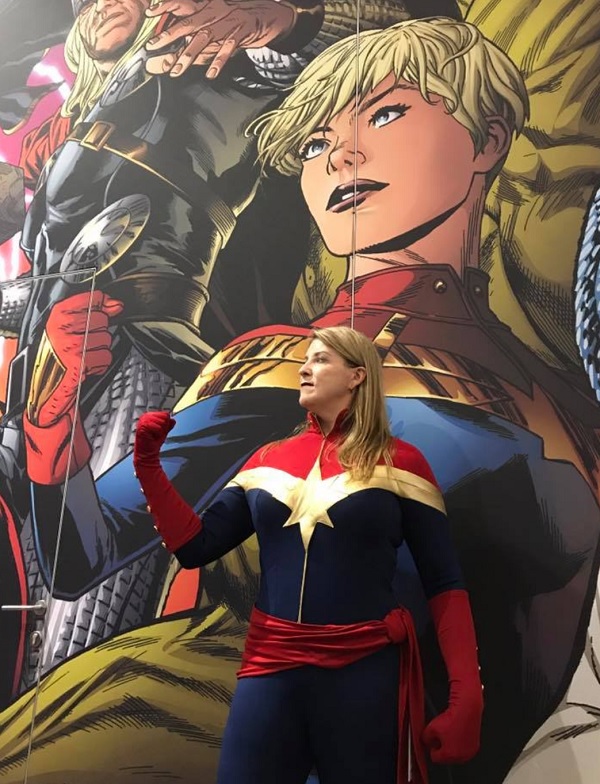
Above: Kate Edwards as Captain Marvel.
GamesBeat: Mental health became a bigger issue as well.
Edwards: Absolutely. In the five years I ran the IGDA I was in a very unique position to interface with so many people, literally thousands of developers worldwide. Government officials, companies, educators, all of the game development ecosystem around the world. But on the developer side, both in the traditional studio system and the indies, mental health issues came up all the time. It was one of the main concerns that came up, or it was often a subtext to other problems.
I had already started the collaboration between Take This and the IGDA when I was still executive director. We released that white paper called “Crunch Hurts” in October 2016 to talk about the physical and mental impact of crunch on developers. Take This was a fantastic partner to make that happen. They came up with a lot of the great medical data in that white paper.
After I left IGDA, Russ Pitts, the creator of Take This, approached me and asked if I would like to be on the board. I immediately said yes, because I love what they do. I think it’s really important. Then I served a brief time earlier this year as interim executive director, when Russ felt like he needed to step out for a while. I filled in for a bit, and now Eve Crevoshay is an awesome executive director at Take This.
I’m happy to support the org, because I do feel that — especially with younger people in the industry, especially with indies, the impact of depression and anxiety and the pressures of releasing a game and dealing with the conflict between your internal creative process and all the external forces of what it takes to make a game, it’s very stressful.
GamesBeat: Just in time for Mike Gallagher to say crunch hasn’t been a problem for 10 years and for the WHO to consider video games a possible addiction.
Edwards: Exactly. Like many people, I’ve been very involved in those discussions. The WHO one was — it was interesting that they took this approach, but — I was the interim ED of Take This at the time. I turned automatically to our clinical director and asked, “What do you think?” He deals with people who deal with all kinds of issues — both in the industry and on the gamer side — all the time. I asked what our response should be. Of course, my gut reaction as someone from the industry is that this is total BS, but we have to keep an open mind about it.
His reaction, as we had several discussions — he said, “My gut sense is that it’s not really a disorder in the clinical sense. But we honestly don’t have enough research to prove either way.” That was the response we issued. We think that the WHO’s declaration is way too premature. We need a better call for research. That was counter to some other voices — for example, some major trade associations out there — who were saying that it’s ridiculous and there’s no proof at all. I think we need to be honest with ourselves. Do we truly, at this point in the evolution of games as a medium, understand every potential impact that it has? I’d say no, we don’t. There isn’t enough research.
GamesBeat: I was of the mind that you can be addicted to anything you’re passionate about. Why pick on video games?
Edwards: That was part of our take as well. Any form of media can be an addiction. I know people who binge watch. Media can trigger certain behaviors in human beings. It’s not just games. Even the whole issue about violence in games. Do games cause violence? I’d vehemently say no. Games don’t cause violence. Do games bring out violent tendencies that might already exist in someone? Potentially. But so can film. So can television. All these other forms could bring that out.
GamesBeat: Did you get the usual mix of social media responses to all these things?
Edwards: Some people maybe felt we should have taken a stronger response. I think taking the honest response is the right way to go. The response is still counter to the WHO’s assertion. We just don’t have enough conclusive evidence to call it a disorder in the way they’re proclaiming. They should have opened it up to discussion and dialogue with the game industry. “From what we’re seeing at the WHO we think this could be a disorder. Let’s have a discussion with you about this.” That didn’t happen.
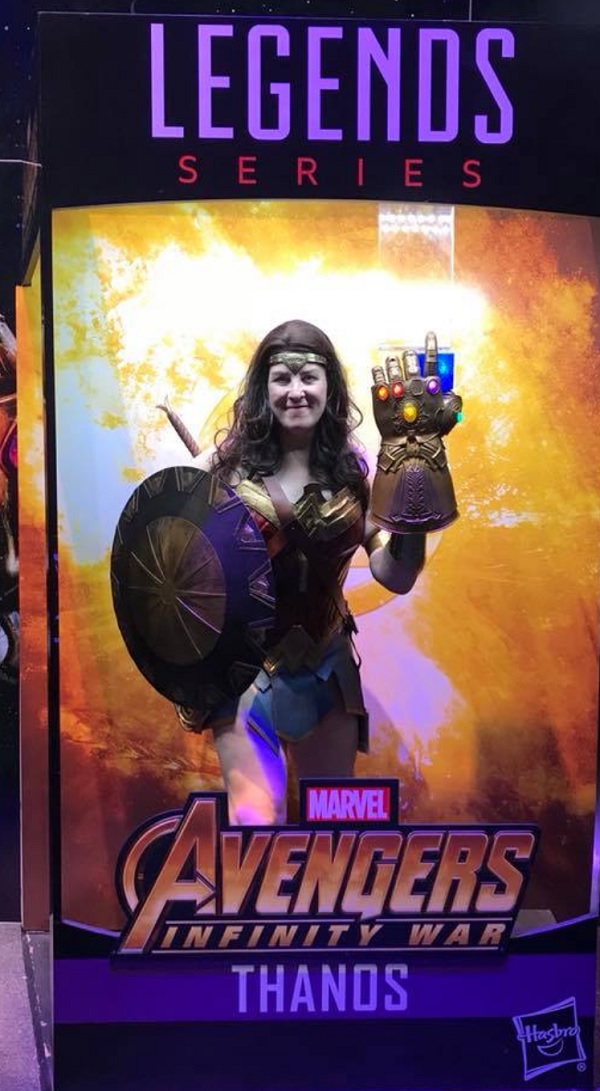
Above: Kate Edwards as Wonder Woman.
GamesBeat: The situation with ArenaNet seems to be a replay of a lot of things related to Gamergate.
Edwards: ArenaNet is an interesting case. Partially because, for a lot of us in the industry, at least from my perspective — maybe I have slight bias because I live in Seattle, so I’m more familiar with ArenaNet. But honestly, I’ve never heard people complain about the company as a workplace. I’ve always had the impression that it’s a very positive place to work, that their practices are on the up-and-up, that they carry themselves well as a company.
This was shocking, I think, to a lot of people. They never had the impression that ArenaNet was — part of how it’s being characterized now on various sides of the argument — it seems counter to what we know, or what we think we know.
GamesBeat: It’s interesting, because it’s an employee action. Usually firings happen very quietly. This one was very public. On top of that, the company is very publicly saying why they did it, and the employee is asking why they’re being so vocal about it.
Edwards: It’s not the usual case. I think frankly both sides could benefit from being quieter. I don’t mean they shouldn’t talk. I just mean that the level of noise that’s being generated right now is not healthy. From what I’ve seen it’s quickly devolved into a Gamergate-style online thing, which I don’t think any of us want to see. We don’t want to see that against ArenaNet or against the people who were fired. We don’t want to see it at all.
GamesBeat: Whoever selectively chooses which facts to emphasize in this case …
Edwards: Right. I’ve had discussions with people at ArenaNet who I know because I’m in the area. The facts versus the world that’s being built in the media — there’s some divergence, from my understanding. But of course, again, it can depend on who you’re talking to. My perspective, as always, is to gather the facts as best I can.
It’s the same issue with how I approach unionization and organized labor in the game industry. I have approached it for years with an open mind. Maybe we do need it. Let’s examine it carefully. Let’s look at what’s on the table, what’s happening in the industry. Maybe that’s a solution.
GamesBeat: Unionization, then, to you, is floating higher as an issue?
Edwards: I think so. That was basically my response to the issue when I was posting about it. To me it adds fuel to the argument. Now, what ArenaNet did behind the scenes exactly, none of us will never really know. But from what we can tell, from what happened, it does add to the fire — there’s an issue of relationships between companies, management of companies, and their employees, how they treat each other.
If it comes to the issue of, is there a social media policy at the company? If there is, great. Did the employee follow it? Yes or no? To what degree was that reinforced? Even if there is a policy, to what degree is the employee expected to be on as a representative of the company at all times? For some people, they just implicitly realize that when they’re working for some companies. For others, there’s a clear work-life balance separating that. I’m now speaking on Twitter on my behalf. But does that require the employee to then make a statement saying, “Attention, I am now speaking on my behalf, my comments do not reflect the opinions of my employer”?
GamesBeat: There’s this perfect behavior that can delineate what an issue is. But there’s no perfect behavior in this case. When is an employee on or off the clock? That’s an issue.
Edwards: Right. To me, that’s the core issue that’s come out of this. Does that relate to organized labor? I think it does. Again, that speaks to the interface between the employer and the employee, what the expectations are there. To loop that back to the broader issue of unionization, one of the key things I heard in all my years running the IGDA, listening to developers’ concerns around the world — the number one thing that was clear to me is that developers are desperate for leverage.
They want the ability to push back when they need to — not all the time, but when they need to, like on crunch. “We don’t want to work another 16-hour day.” Of course, typically, if they’re in that kind of situation, management will tell them, “That’s great. Go ahead and leave. I have 20 people who’ll take your job tomorrow.” They use that pressure to shut them up and keep them in their seat. That kind of thing frustrates developers.
One of the things that’s been contrasting is when you look across the aisle, so to speak, to other tech companies. Developers look at some of their friends who have left the industry to work at Google or Facebook or any number of companies. Those companies are also intense work environments, but they have a larger respect for their employee’s time. They have better policies around flex time. Of course they’re producing something entirely different. They’re not all working heads-down on a game, on a single creative vision. But they’re still working on some kind of product. I don’t see the divergence being that great.
Seeing that contrast, looking at friends in other companies, developers ask, “Wait, you’re not working this weekend? You get paid for this?” There’s a growing frustration about how we in the game industry are different, and not in a good way.
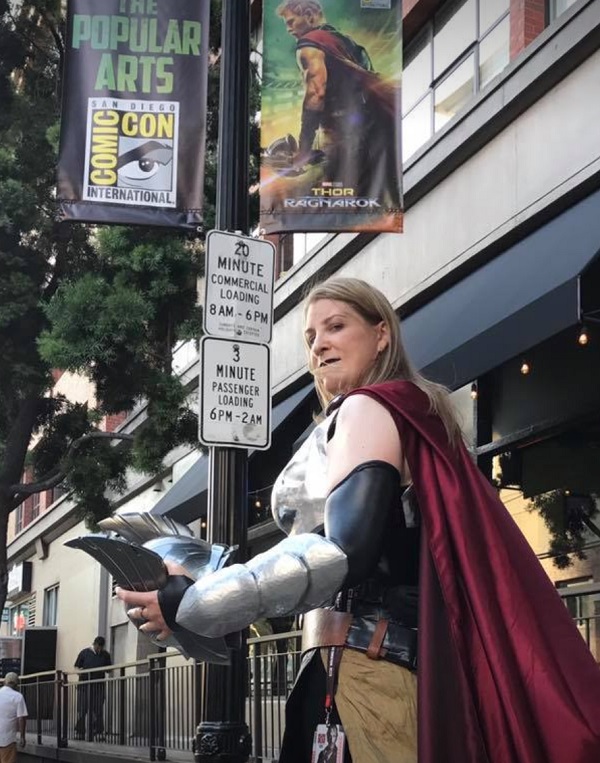
Above: Kate Edwards fits right in.
GamesBeat: Do you gauge whether — the ESA’s response was that unionization is a small concern for a small number of people.
Edwards: Yeah. [Laughs]
GamesBeat: Do you get the feeling that this is a bigger problem?
Edwards: Yes. It’s a significant issue, a very significant issue. Just going by the developer satisfaction survey results when I ran the IGDA — we created that survey, and in one of the surveys we had 56 percent of respondents saying they’d vote today for a union. In the survey about five years prior, it was only 33 percent. Going by the survey response, and just the anecdotal evidence from talking with so many people, my impression is that the desire for leverage is a lot greater now.
Part of that, too, is a generational factor. Part of it is being fed by — you have people who have different value sets. They have a greater desire to actually have a work-life balance. They have the same passion to make games that anyone else in the industry has had, but my sense is that they have a stronger sensibility around having a well-rounded lifestyle. Not just giving your life over to the game.
Just to footnote that, the ESA’s response is probably about as tone-deaf as I could have expected. I would expect them to be a little more up on the sense of things. But their constituents are companies. They’re not developers. It’s not shocking. But I can say with complete confidence that the sentiment right now is much stronger than they think it is.
GamesBeat: The ArenaNet thing has probably affected that.
Edwards: I think it has. Any issue we see pop up, any issue that emphasizes that there is a disconnect between the expectations from employer to employee in this industry — we’ve seen that time and again in the work-life arena with crunch. We’ve seen it with other issues like lack of diversity and inclusion, the lack of will from companies to change that. Not universally. Some companies are doing better, are doing very well. But there are lots of issues like that. Any time something like this happens, it revives that concern. It’s fueling a greater sentiment, in my view.
GamesBeat: Are there any other big things on your mind lately?
Edwards: Stuff like indies being screwed over by publisher contracts — can a union stop that? Not in my view. They’re not going to be able to deal with that. That’s why my approach to providing leverage is to explore the unionization angle, because I think that’s going to help a lot of people in the industry, but it’s not going to help everybody. I can’t see a three- or five-person indie studio unionizing. They’re basically all management and employees at the same time. For larger companies, yes, but for small companies and other cases, I think our industry could use a legal defense fund.
That’s one thing I’m working on more fervently at the moment. That would have more universal applicability. If you’re being harassed at a triple-A company and your managers aren’t listening to you, you would have a resource. If you’re an indie who needs help with a contract, you’d have a resource.
GamesBeat: You went to Tehran and had an interesting experience there.
Edwards: I did. When I was running the IGDA, I was invited to Iran a couple of times, but it never worked out with my schedule. Fortunately, this year it did. It took a while to get my visa as an American citizen, but I did. Picked it up in the Netherlands. It was a phenomenal experience. The organizers did a great job putting together this conference. It was a lot larger than I expected. They had at least 1,200 or 1,500 people there. The Minister of Culture visited on the second day. From what I was told by the organized, he’s very pro-video games. The mayor of Teheran was at the closing ceremony.
Like every experience I’ve had when I visit emerging markets — and I’ve done a lot of that in my last several years, both in the IGDA and outside of it — you start to very quickly realize how similar we all are. It’s a wonderful thing. Game developers all around the world have the same concerns. One thing I kept trying to remind the developers in Iran — they kept talking about how they’re desperate to find publishers, desperate to get exposure. They’re no different from any developer anywhere else in the world.
That gives an instant commonality with this group of people around the world, but at the same time, it also punctuates the differences. They’re under sanction by a large part of the world. It makes it really challenging for them. How do they get their content out? As a content market it’s very closed. You sell your games within the country. They want to have a voice outside their country.
Some companies are trying to figure out creative ways to do that. I know one that said something about having a path from Iran to another Middle Eastern country to a European country, a way of getting games out of Iran so they can have exposure to a wider audience. One thing I was trying to encourage them to do, as I’ve done in a lot of emerging markets — they’re sitting on such tremendously rich history. They’re the current successors to the Persian empire. They have millennia of history. Instead of trying to copy the west and do things we’re doing — they have so many great historical events and characters to leverage.
I started my keynote to the event by showing them some of the ancient Persian board games that were created in the region. Some of the developers afterward said that they didn’t even know they had that history. Part of it was just encouraging them — hey, you helped start this for humanity. This art form, this narrative of games, you helped create this, and now you’re on the other side helping carry it forward. Hopefully that message will get across. I saw some games that were based on local legend and history.
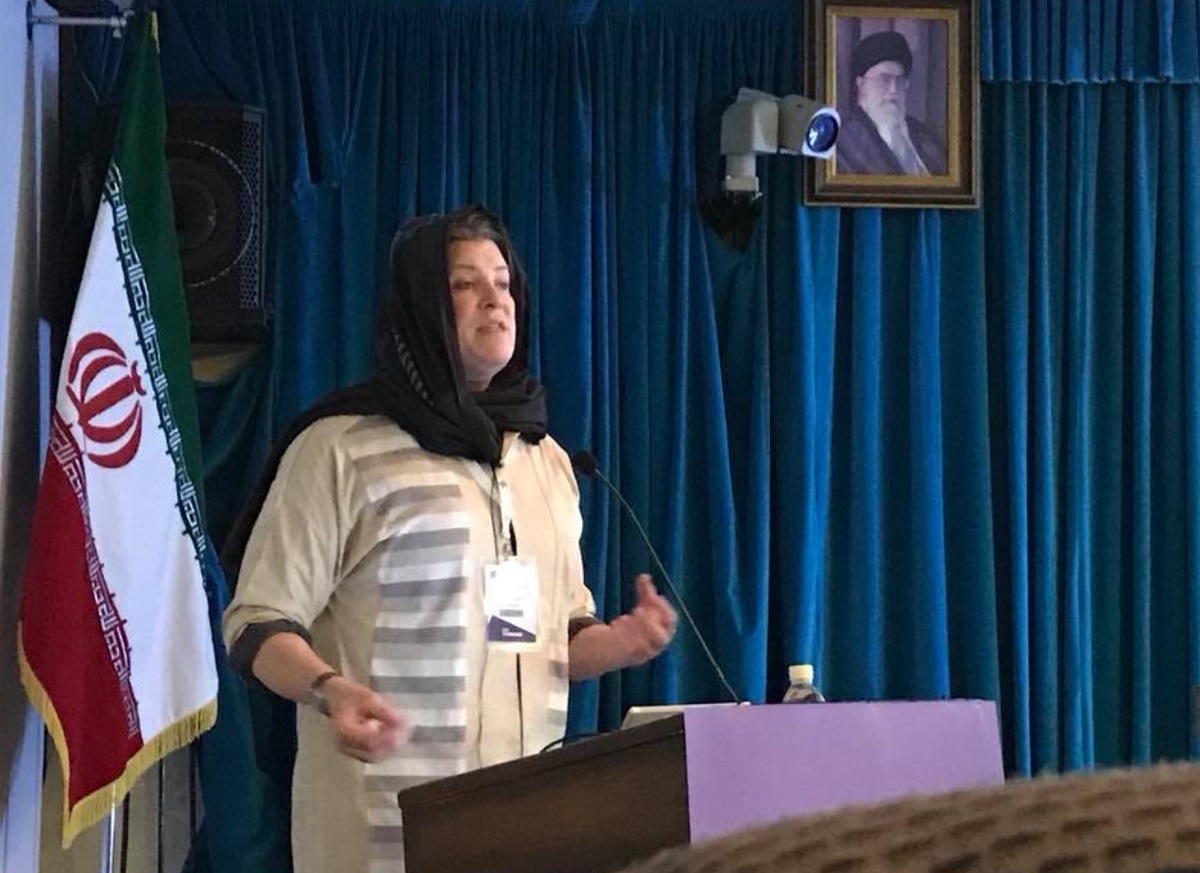
Above: Kate Edwards gives a speech at a game conference in Tehran.
GamesBeat: It seems like a country where you have to be careful what you say, still. How did you think about that?
Edwards: It’s interesting. I did the opening keynote for the conference, but later in the day I gave an advocacy-related talk, similar to the ones I’ve given recently, where I encourage developers to stand up, to overcome whatever issues might be holding them back, imposter syndrome or whatever it is, and find their righteous rage, as I call it. Stand up and address issues that are affecting them, whether it’s something very local to their — if it’s in your studio, in their city, in their industry environment, whatever it might be, see what you can do to make change. That’s the message. Find it within yourself to make change, because evil triumphs when good people do nothing.
As I was up there on stage giving a message like that in Iran, I was conscious of the fact that — here I am, an American, basically encouraging a form of rebellion. Obviously my focus is on rebelling against things that are wrong in our industry, things we want to fix or make better in our industry. But I was mindful of the fact that this could easily be misinterpreted as a political statement. I had to be careful. Of course, as a woman in Iran I had to wear the hijab the entire time, regardless of 105-degree heat. There are things you have to be mindful of. I was trying to be as careful as I could.
GamesBeat: It’s a brave thing to do. That seems pretty normal for you, though, going all over the world.
Edwards: I feel it’s necessary. I guess part of it is me as a geographer. I’m curious about the world. The way that fuses with my passion for games — I want to go wherever I need to go to help developers wherever they are.
I had a couple of people who are from Iran and live in the west, live in the U.S., who pushed back on me after they saw that I was there. They said, “Why are you supporting this regime? Why did you go?” Ultimately, my mission, if you will, is to help game developers. I want them to succeed because I love this medium. I love what they do. If that means going somewhere like Iran, I’ll do it. Now, will I go to North Korea? Probably not? That’s another story.
GamesBeat: They need to start making more games first.
Edwards: True. I don’t know that there’s much of a game market in North Korea compared to Iran. But it’s important for us — events like this go to great lengths to try to get external people to come in and help. I had discussions with some government folks while in Iran about, for example, how desperate they are to get more help from the west to build their knowledge. They have a lot of technical skill. They’re one of the biggest producers of engineers in the world as a country. But they don’t have a lot of the game design knowledge. They’re desperate for it. They have government support, and so the issue is, how do we carefully navigate that space and help game developers succeed there, while being mindful of the politics involved? It’s not easy.
GamesBeat: What do you bring back from all these travels for American developers to learn?
Edwards: It depends. For me, a lot of what I bring back — one thing I’ve noticed in all of my travels, and one of the things I really like, especially about visiting emerging markets — my sense is that for a lot of these developers, there’s a level of naivete. They don’t have the history of games in their markets as much as the west or parts of Asia. But there’s this incredible depth of passion for the medium.
You see that in the west too, but often, in my perspective, it tends to have a layer of cynicism on top of it, because of all the things we’re very much aware of in our industry. The work-life balance issues, lack of diversity, online harassment, all these other issues. In these other markets, they may be aware of these things, but they don’t experience them as much or as directly. It’s this unbridled passion for just making games. It’s refreshing to see.
Trying to transfer that back to the west and say, “Don’t let cynicism get the best of you. Try not to anchor yourself.” It’s so easy. The ArenaNet thing alone recently — I know so many people who repeated their assertion that they should just leave the industry. “I’m done with it. I’m tired of hearing about this kind of thing.” I completely understand why they would say that. I want to tell them — just over that hill, so to speak, there are people who are as excited about games as we used to be, or still are in our less cynical moments. It’s so cool to interact with them.
My hope is that as we communicate better with each other as game developers across the world and find different channels to do that, we can maybe draw on some of their passion as we help them. That’s a relationship I’d love to see more. How do we help people in these markets who need the knowledge and need support to help grow their ecosystem? We might find a renewed spirit for the medium that we love and work in.
I guess that’s part of an idealistic hope on my part. I openly admit to people that I tend to be idealistic, but that drives me forward. I believe that things can change. Some people think it’s idealistic even to assert that, but I believe it.
GamesBeat: Do you believe that hits can pretty much come from anywhere now?
Edwards: I do. A successful game can theoretically come from anywhere. How it emerges into the market, how it reaches the market, and which platform it’s on — there are so many factors to success. But a lot of it tends to be a bit of serendipity. Often we talk about the Angry Birds example, this game from a small studio in Finland that found its way to success, but there were a lot of factors that enabled that, like being one of the early games on the iPhone platform. It was an intersection of technology and a lot of other market factors.
I do think a game can be successful from anywhere. It’s just a question of whether you can predict it. That’s the problem.

Above: Kate Edwards as Indiana Jones.
GamesBeat: What would you predict for the games business going forward?
Edwards: One of my big things that I’m pushing for, and why I still advocate for this industry — it’s because I want it to mature. I want it to better represent itself. One of the big things I’ve been harping on after I left the IGDA is about how we as an industry don’t speak for ourselves. We let the broader public media shape the narrative of who we are as a medium and who we are as people making games. You see acts of violence and we’re instantly criticized and painted a certain way.
I always assumed the trade associations were the ones who were going to stand up and defend us, and in some cases they do. But for the most part their role is to interface with government. That’s a very important role. It’s a critical role. The Supreme Court decision in 2011 is the ESA’s success. That’s a major victory for the industry in the United States. For the rest of the world it has no direct impact, but it might have influence. That was a great thing.
But when I constantly meet people in the public who still assume that games cause violence — there was the Pew Research study from just a few years ago, where they asked questions of American adults. Do games cause violence? Do they cause obesity? Repeatedly, all of the perceptions are completely counter to what we believe the narrative is. No, they don’t violence. No, they don’t cause obesity. No, they’re not a waste of time. But the public still thinks that.
Who is representing us to the public? Who is out there correcting the record when you see a story in the media that assumes someone committed an act of violence because they play games? There’s a lot of churn internally within the industry among developers about this, but who is stepping up and saying, “Wait a minute, that’s not true. Here’s research. Here’s evidence.” Sometimes the trade associations do it, but a lot of times they don’t.

Above: Kate Edwards led an effort to document and reduce crunch time in gaming.
GamesBeat: There’s perhaps a perspective problem around whether games are a subculture or part of mass culture.
Edwards: Right. What I’m trying to assert, and I think a lot of us understand this implicitly — I think we need to understand that we are mass culture, and we have been for a while. We need to step up our — I use the word “maturity,” when it comes to how we handle our response to the public and how we interface with the public. My assertion is that it’s developers who need to do this. Not the companies, although that would help. Developers themselves need to step up and be more vocal. “This is what I do. I’m proud of what I do. I’m not ashamed to call myself a game developer. My product does not cause violence.”
I’ve heard a lot of anecdotal stories where, for example, a game developer in a local jurisdiction invites a politician to their studio, someone who may be anti-games or may be ambivalent, and they show them. This is how games are made. They step them through the process. They let them meet people. These are people with families who are contributing to your economy. They have a going concern. Why aren’t you supporting these people? There have been stories where the attitude of politicians have changed 180 degrees after just one visit.
The more we can open up the black box about what we do as an industry — one of the reasons film doesn’t have this problem so much is that most of the public understands how movies get made. There have been films about making films, lots of them. The public understands the process of filmmaking and what it entails. With games, not a lot of people understand how games get made. We’re just this big black box, and some people believe that evil comes spitting out of it that’s going to destroy society. It’s on us, truly on us, to open up the box and share with the people around us. “This is who we are. This is what we do. We don’t need to be apologetic.”
